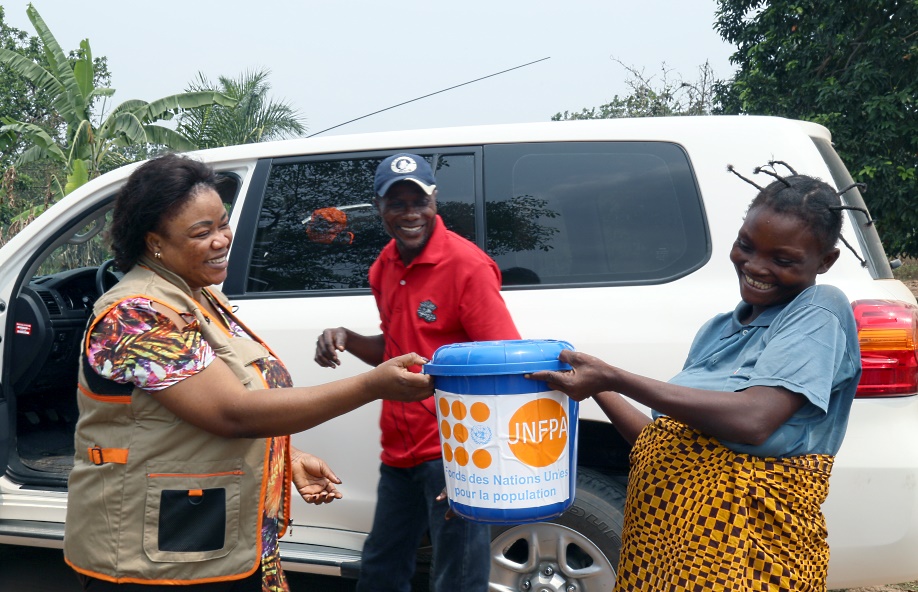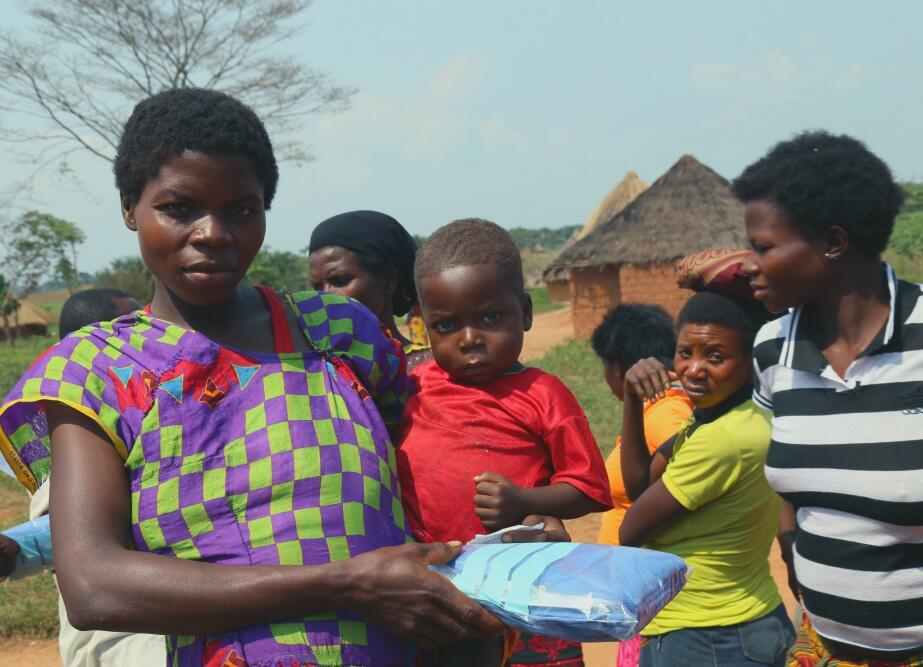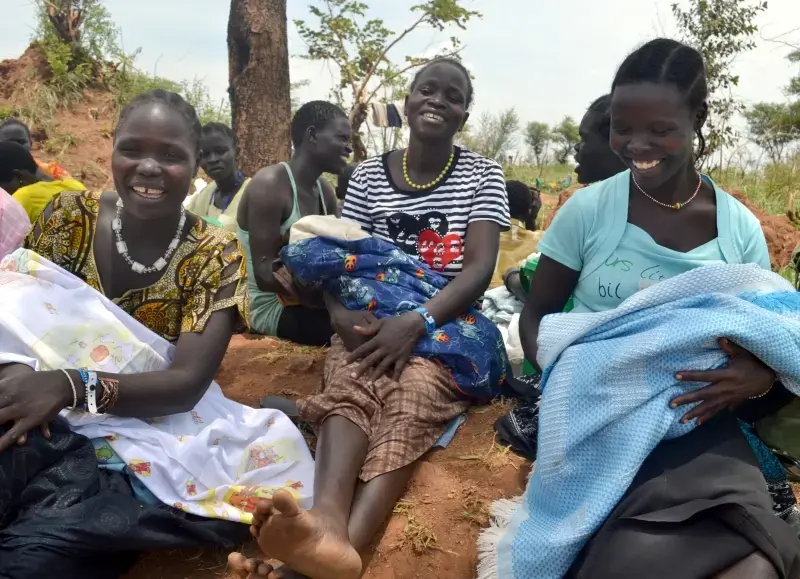KASAI, the Democratic Republic of the Congo – When Jacqueline Lusambo fell pregnant with her second child 8 months ago, not once did it occur to her that she would be forced to see the pregnancy to term in the bush without her husband.
At the time, the young mother was living comfortably with her husband, her grandmother and her 1-year-old boy in her village, Milambo, around 50 kilometres from Kananga, the capital city of Kasai Central.
Jacqueline is 18 years old. She was married at age 15 to a man twice her age; child marriage is common in these parts of the DR Congo.
Today, she finds herself on her own.
She has not seen or heard from her husband since February when, fearing for their lives, they fled their village. In the conflict between government forces and armed groups, neighbouring villages have been destroyed and villagers kidnapped and killed, she said.
Over a million forced to flee their homes
There are many dislocated families with tragic stories like (hers), as the violence that started in Central Kasai has now spread across the 5 provinces.
Jacqueline is among an estimated 1.4 million people who have fled their homes over the past year. She does not know if her husband is one of the estimated 3,300 people who have since been killed.
“There are many dislocated families with tragic stories like (hers), as the violence that started in Central Kasai has now spread across the 5 provinces of Kasai, Kasai Central, Kasai Oriental, Sankuru and Lomami,” said Innocent Ilenga, the coordinator in Kananga for ADSSE (Association pour le Développement Social et la Sauvegarde de l'Environnement), a local non-governmental organization in charge of registering internally displaced people. Many people were hiding in the bush under difficult conditions or being sheltered by host families, he said.
Reaching women via mobile clinics
This is the only way we can reach these women and save their lives, as most of them are afraid to go to health centres for antenatal care.
UNFPA, the United Nations Population Fund, is using mobile clinics to reach out to the many pregnant women who, like Jacqueline, are living in the bush. This is being done through the Fund’s implementing partners, Caritas Congo and Caritas Kananga.
“This is the only way we can reach these women and save their lives, as most of them are afraid to go to health centres for antenatal care,” said Dr. Marguerite Kunduma, Coordinator of the UNFPA Decentralized Office, which covers Kasai.
The mobile clinics provide lifesaving interventions as they offer basic emergency obstetric care, in areas where health centres and hospitals have been looted and destroyed. They also support existing health facilities with the basic and emergency reproductive health services and supplies needed, she said.
Jacqueline's first antenatal care visit, at 8 months
It was on one of these mobile clinic days at Kalomba Health Centre, 44 kilometres from Kananga, that Jacqueline showed up for her first antenatal care check up while eight months pregnant, her 20-month-old baby in her arms.
Jacqueline’s case is not unique, especially since the latest conflict erupted, according to Agnes Bilondo, a midwife at Tshikula Hospital, which covers the area in which the mobile clinics are on secondment. They are many pregnant women who never visit a health centre and who give birth in the bush unattended, she said.
Along with Jacqueline, 176 other pregnant women, sitting on the ground outside and inside the tiny mobile clinic screening room at Kalomba Health Centre, have been attended to that day. Of these, 8 cases of pregnancy-related complications were detected and referred to Tshikula Hospital for further care.
Aged between 14 and 37 years old, each of the girls and women received a clean delivery kit, deworming drugs and vitamins to prevent anaemia, as malnutrition is increasing within affected populations. They were also warned of the danger signs for pregnant women and those on family planning.
“We do not only provide lifesaving interventions at the mobile clinics,” said midwife Agnes Bilondo. “We also do community awareness raising on sexual and reproductive health, and the causes and effects of gender-based violence, as well as the available services.”
UNFPA provides critical support to health facilities
We were powerless before. With the kits received from UNFPA, we can now provide post-rape care and address sexual transmitted infections.
UNFPA has donated items to health facilities like Tshikula Hospital. These include reproductive health kits for a clean delivery, post-rape treatment, and treatment for sexually transmitted infections (STIs). Support has also been provided for clinical delivery, management of miscarriage and complications of abortion, sutures of tears, vacuum extraction delivery and management of more severe obstetric complications such as Caesarian sections, ectopic pregnancies, and blood transfusions.
Among the health facilities that have been supported by UNFPA is Kalomba Health Centre. “With the kits received from UNFPA, we can now provide post-rape care and address sexual transmitted infections,” said Louis Tshiyoyo, the nurse on duty at the centre during the placement of the mobile clinic. His face gleamed with joy, as he was able to attend to his patients properly, he said.
That day, 64 cases of patients with sexually transmitted infections, including 8 patients under 18 years and 2 survivors of rape, were treated. “We were powerless before,” he said. “We used to (be) unable to assist, as they cannot afford to buy prescription (drugs) and we did not have any drugs or antibiotics to provide them with the needed care.”
170 health centres affected by conflict in Kasai
2,700 gender-based violence survivors and 3,000 women with obstetric complications could be managed, including (those experiencing) prolonged and obstructed labour, and miscarriage, with the kits provided.

The reproductive health kits are part of UNFPA’s response to the humanitarian crisis, following the outbreak of violence in the Kasai region. The conflict has affected 170 health centres and limited access of the affected populations to lifesaving sexual and reproductive health and gender-based violence information and services.
Three months’ worth of reproductive health kits for the health needs of an estimated 450,000 people have been supplied to 25 health facilities, with a special focus on the 112,500 women of childbearing age, including 22,500 pregnant women. These health facilities are located in the 8 most affected health zones in Kasai Central, Kasai and Kasai Oriental, said Dr. Polycarpe Takou, UNFPA Humanitarian Coordinator.
“2,700 gender-based violence survivors and 3,000 women with obstetric complications could be managed, including (those experiencing) prolonged and obstructed labour, and miscarriage, with the kits provided,” he said.
Urgent funding required to meet girls and women’s needs
However, he expressed concern for the limited funding available for the response in the Kasai region, despite the seriousness of the situation. “As people are returning to their villages from their hideouts in the bush and the host communities, we urgently need to scale up our humanitarian response through the establishment of more accessible gender-based violence services and sexual and reproductive health interventions. For that we need more funding,” he said.
Engagement with donors remains critical, he said, as the needs are huge and the partners’ response slow. He gave an example of the level of funding needed by the UN flash appeal for Kasai, launched in late April. “It is funded at 26 per cent, or $16.8 million, including pledges, out of the $64.5 million requested,” he said.
Despite the funding challenges, UNFPA is establishing a new hub in the Kasai Central province to be better able to address the reproductive health needs of the affected populations and support survivors of gender-based violence.
Urgent need to scale up operations
I will continue to come (to the mobile clinic) until I deliver.
At the mobile clinic, midwife Agnes Bilondo is overwhelmed by the sheer number of women waiting to be screened at each location where they set up. “We screen at least 150 pregnant women every time we go out,” she said. There is a sense of urgency to scale up the operations.
News of the availability of services at the mobile clinic circulated quickly among the affected populations as they exchange goods on Fridays, at the weekly market. That is how Jacqueline heard about the services.
After her first visit she vowed to return, despite her three-hour-long walk to the clinic. “I will continue to come until I deliver,” she said. She wants to remain healthy – and stay alive – to be able to care for her children. With the disappearance of their father, she is the only one now who provides for them, she said.
- Assane Ba



